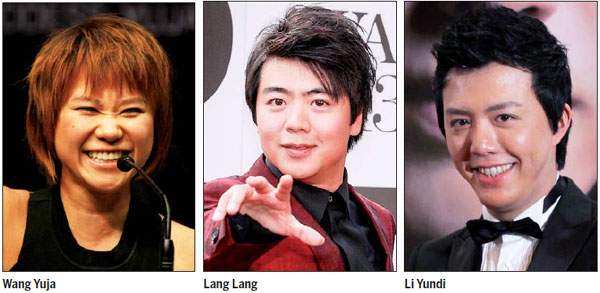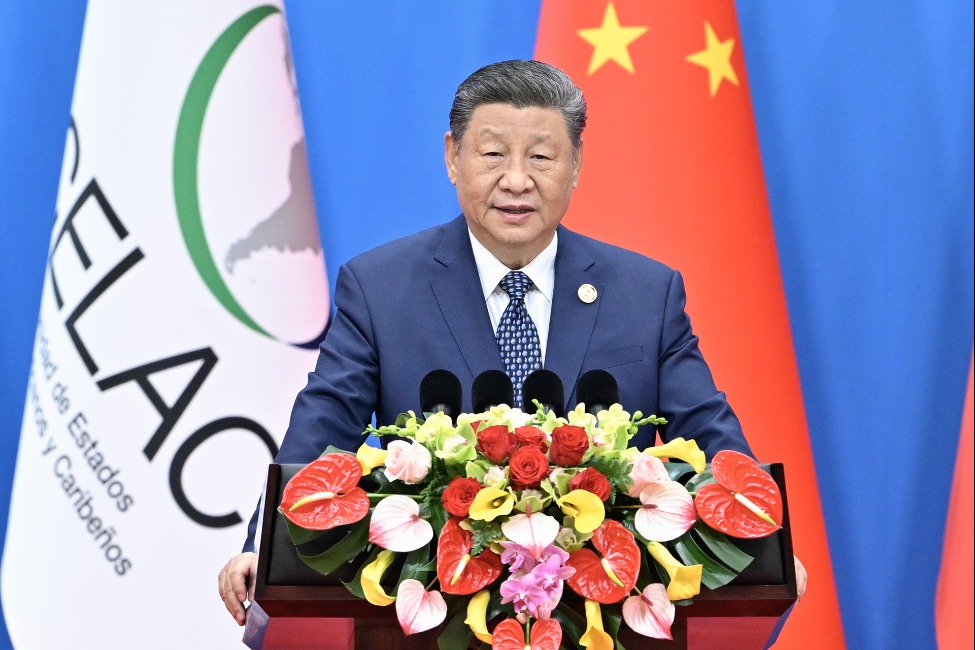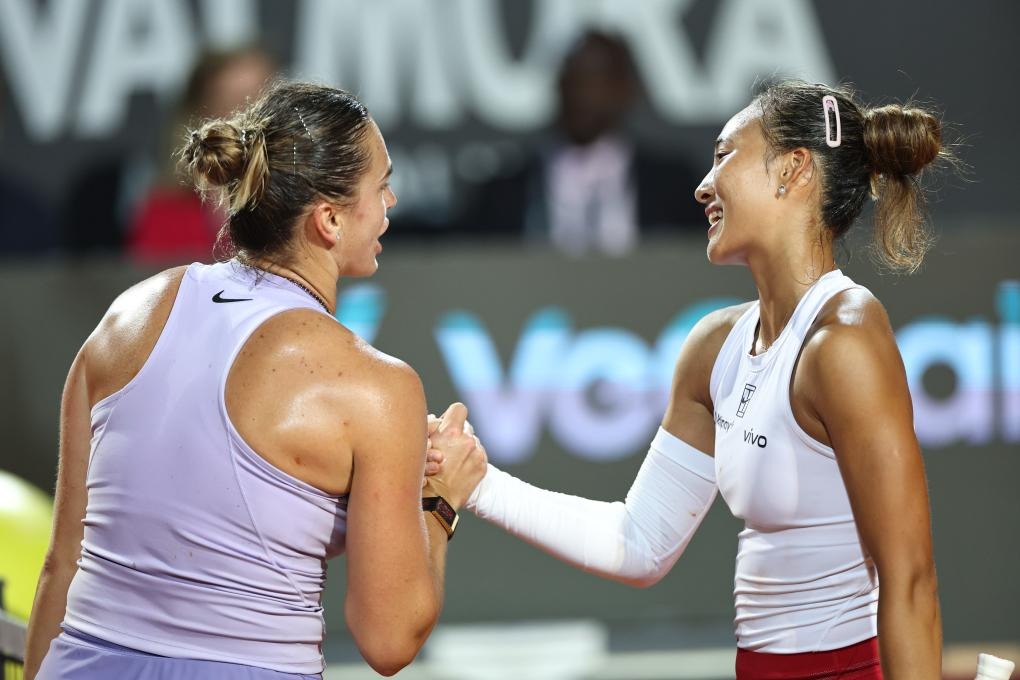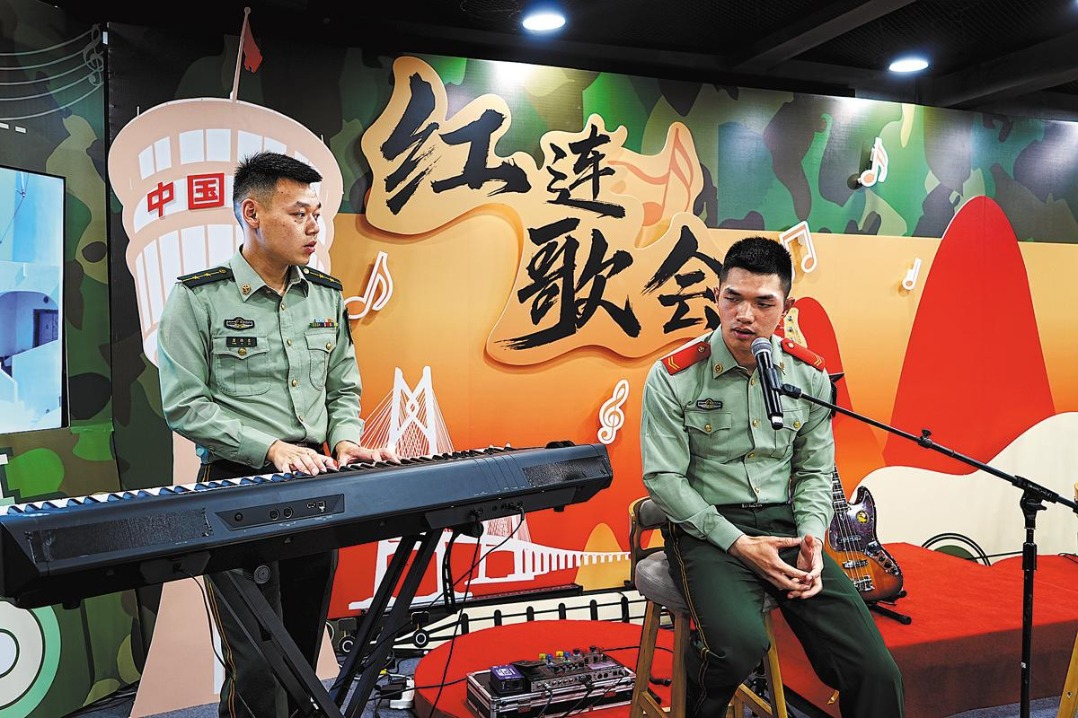China's 'big 3' keep their individuality

China produced 376,000 pianos in 2013 - 80 percent of the world's total. But keyboards and pedals are not the only things the country makes.
China's crucible for talent has produced some of today's most feted young classical pianists.
When I prepared this story, I watched a video online of Kurt Masur conducting Wang Yuja playing Mendelssohn's Piano Concerto No 1 in G Minor.

The 27-year-old Chinese classical pianist is widely recognized as one of the most important artists of her generation, and she has won numerous international awards, including the Gilmore Young Artist Award in 2006 and the prestigious Avery Fisher Career Grant in 2010.
In the video, Wang is wearing smoky eye makeup and a violet evening dress with a deep V-neck, her hair tousled in Spice Girl style. She seems to be enjoying herself immensely. Her nimble fingers run smoothly over the keys, creating a crisp, clean, sinewy melody, which matches her image and imparts the jaunty, unruly brilliance of youth.
In other concerts, Wang has appeared in tight, bright skirts and 3-inch heels that make her appear even more like a pop star.
Wang's eye-catching style has raised questions about whether it is suitable for classical music.
But Wang not only has confidence in her talent and taste, she also is independent enough to challenge the existing rules.
"They have rules about what classical musicians should be wearing, which I think is stupid," The New York Times quoted Wang as saying.
"I wanted to do the shock value. I can wear long and black, too. I like being versatile," she told the newspaper.
Wang never reads reviews about her performance. She wrote on Twitter that "Music criticism should be to musicians what ornithology is to birds".
The only daughter of a dancer and a percussionist, she was born in Beijing in 1987. She started to learn the piano at age 6, and she studied at the affiliated primary and middle school of the Central Conservatory of Music in Beijing. At 12, she went alone to study at the Mount Royal College in Calgary in the Morningside Music summer program, an artistic and cultural exchange program between Canada and China, and later began studying at the conservatory there.
In 2002, she moved to the United States to study at the Curtis Institute of Music in Philadelphia with Gary Graffman, who was also Lang Lang's mentor at Curtis.
Graffman says that during Wang's audition, he was impressed by the intelligence and good taste in her interpretations of musical works.
Since they had same teacher at Curtis, Wang is often asked about Lang but she always says that they are very different artists with very different personalities.
Lang, 32, seems to have appeared at every gala occasion in recent years: the 2014 World Cup concert in Rio de Janeiro, the 56th Grammy Awards, the opening ceremony of the 2008 Beijing Olympics and the Liszt 200th birthday concert that was broadcast live in more than 300 movie theaters in the United States and 200 cinemas across Europe; the list goes on and on.
His biography, Journey of a Thousand Miles, published by Random House, has been translated into 11 languages.
People sometimes frown over his high profile, but Lang, born in early 1980s, has his own attitude toward his life and the world.
"The education in society sometimes is more important than that provided by schools, and is actually the foundation for an arts education. Performers should find more time to take part in this social education," Lang said at the launch ceremony in Hamburg in 2009 for the Lang Lang International Music Foundation, which seeks to bring music into the lives of children around the world.
Lang started playing the piano at 3. At 13, he played the complete Chopin Etudes at Beijing Concert Hall. At 14, he went to the US to study at Curtis with Gary Graffman. At 17, Lang made his name through a dramatic last-minute substitution for a famous pianist. In the "Gala of the Century", he substituted for Andre Watts, playing a Tchaikovsky concerto with the Chicago Symphony Orchestra.
The third celebrated Chinese pianist of the same generation as Lang and Wang is Li Yundi.
Li, also born in 1982, is by far the youngest winner of the International Chopin Piano Competition, the Olympics of piano competitions. When he won the competition at age 18, he brought to an end the run of 15 consecutive years when no one won first place.
Compared with Lang and Wang, Li enjoys keeping a much lower profile, although more than 16 million follow his microblog
In earlier years, Li had longer hair, which made him look gentle and romantic, matching the music of the composers with whom he is associated.
In 2003, his album Liszt was named by The New York Times as the "album of the year".
But recently he has adopted a higher profile, frequently appearing on TV entertainment programs and working with pop singers such as Leehom Wang and Jay Chou.
The three young Chinese pianists of the 1980s generation have drawn the world's attention not only with their talent but also with their different personal styles and characters.
These young people are successful being themselves, inspiring more children around the world to realize their dreams.
(China Daily European Weekly 12/05/2014 page25)
Today's Top News
- China vows to strengthen domestic circulation
- Peace momentum must be sustained by talks between Russia and Ukraine: China Daily editorial
- Xi's Quotes: Shared wisdom in Chinese and Latin American cultures
- Xi replies to founder of Danish Chamber of Commerce in China
- New guideline bolsters green inspections
- China, Chile urged to create model of common development






























